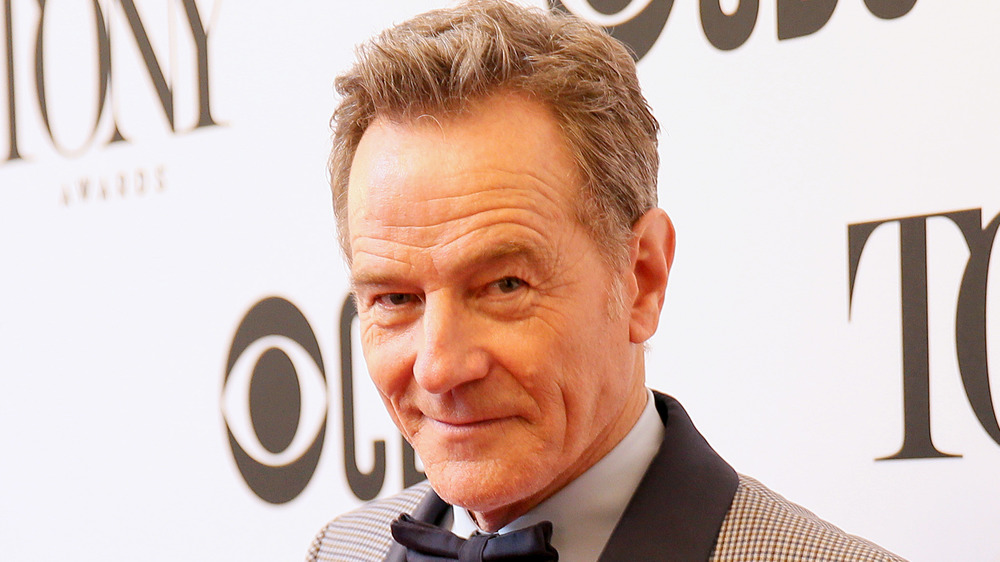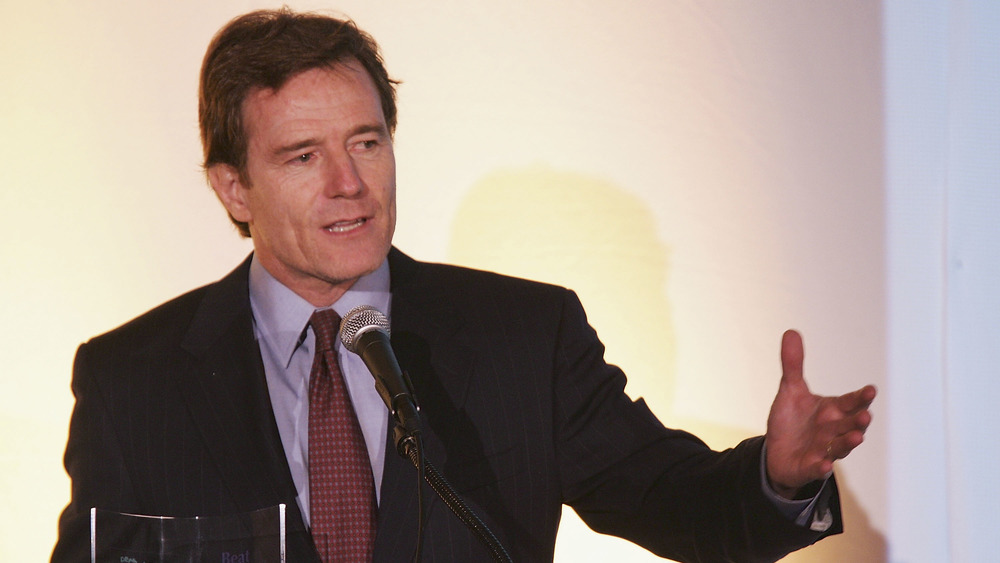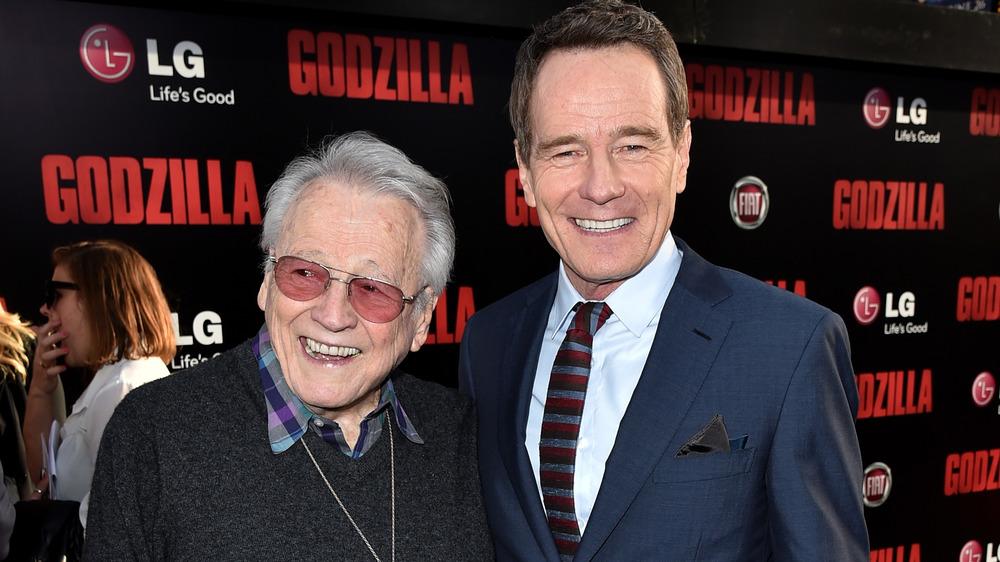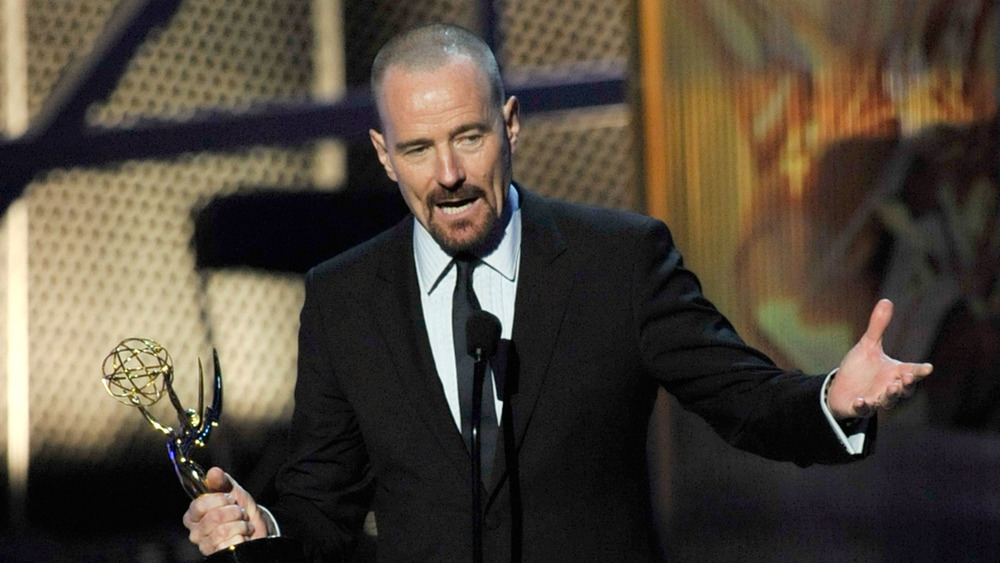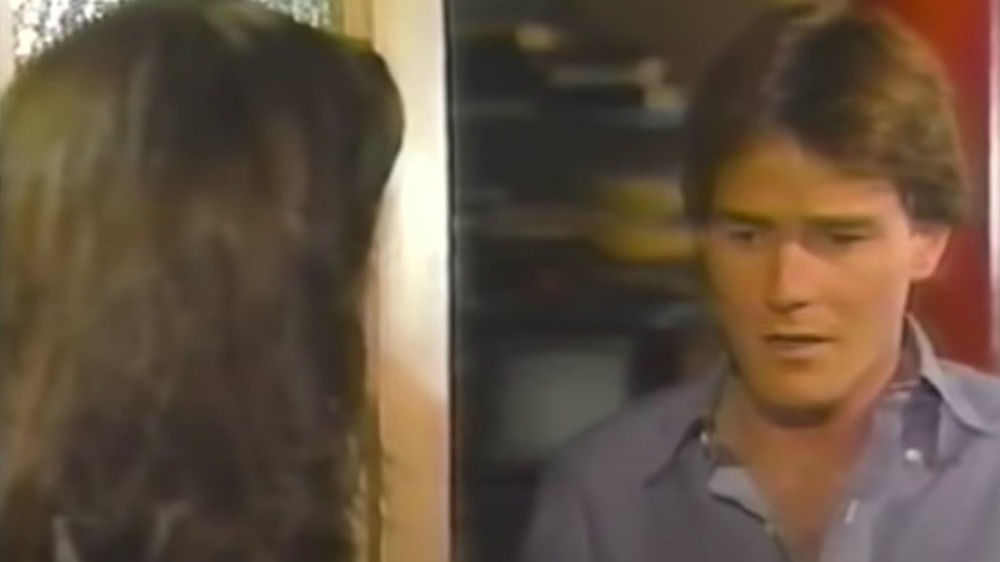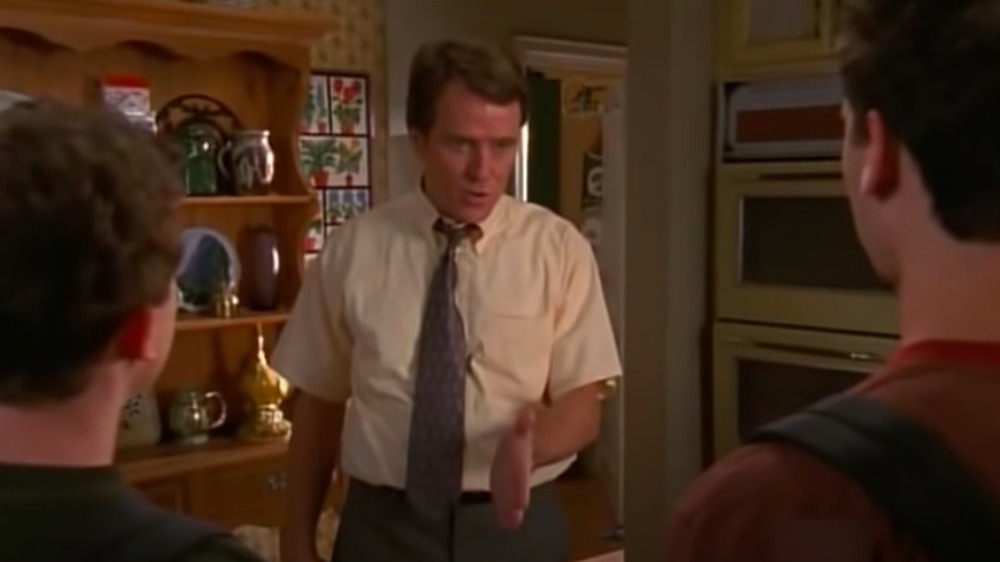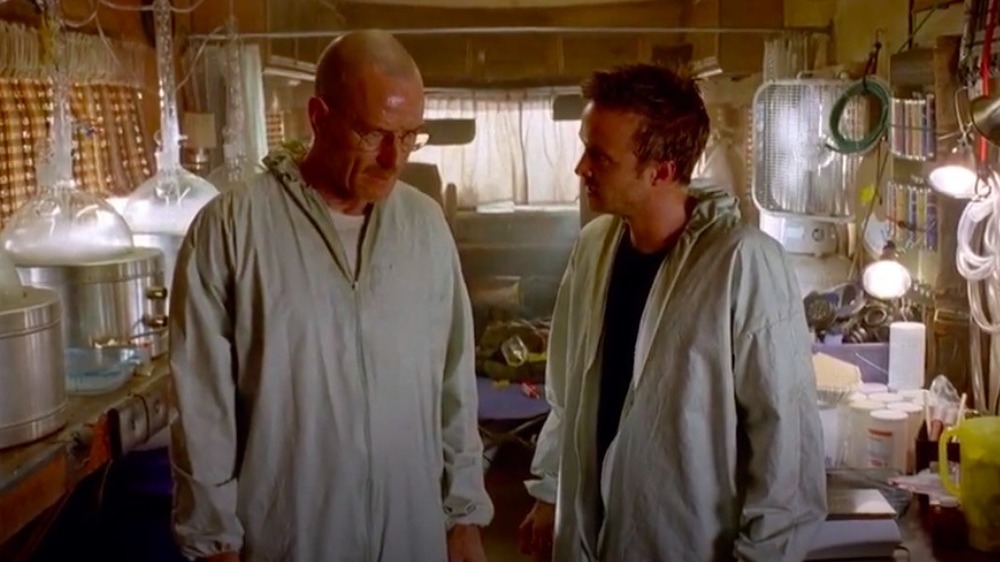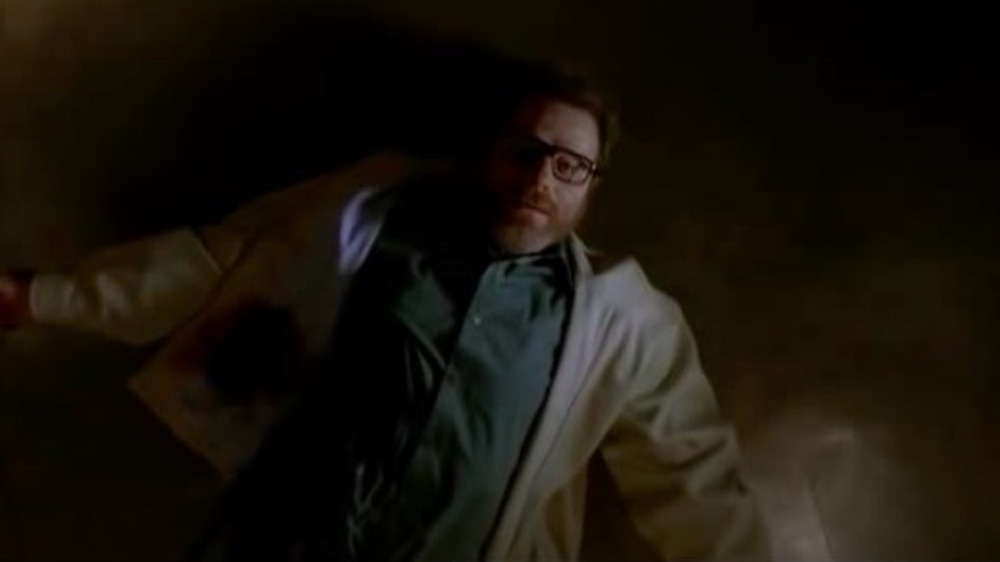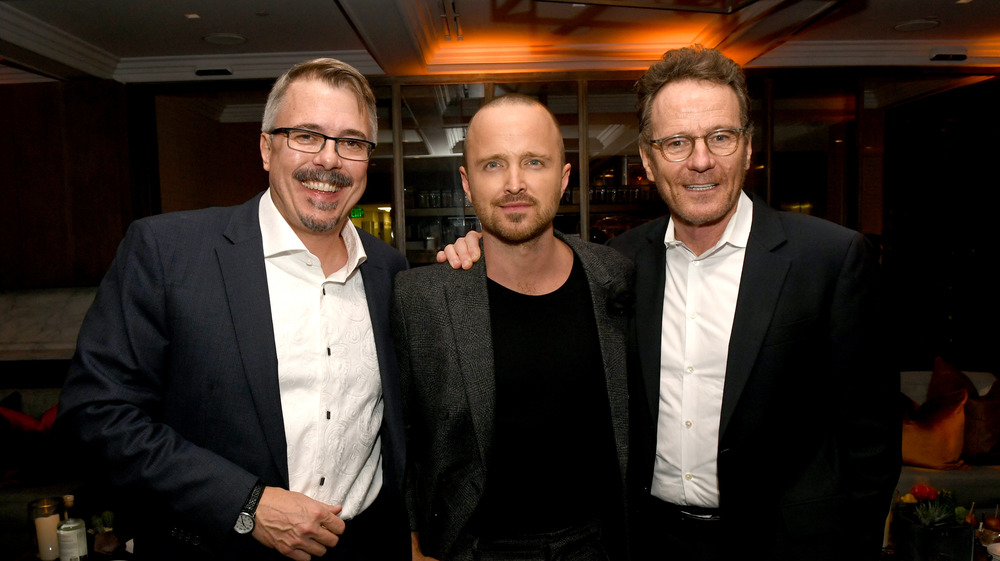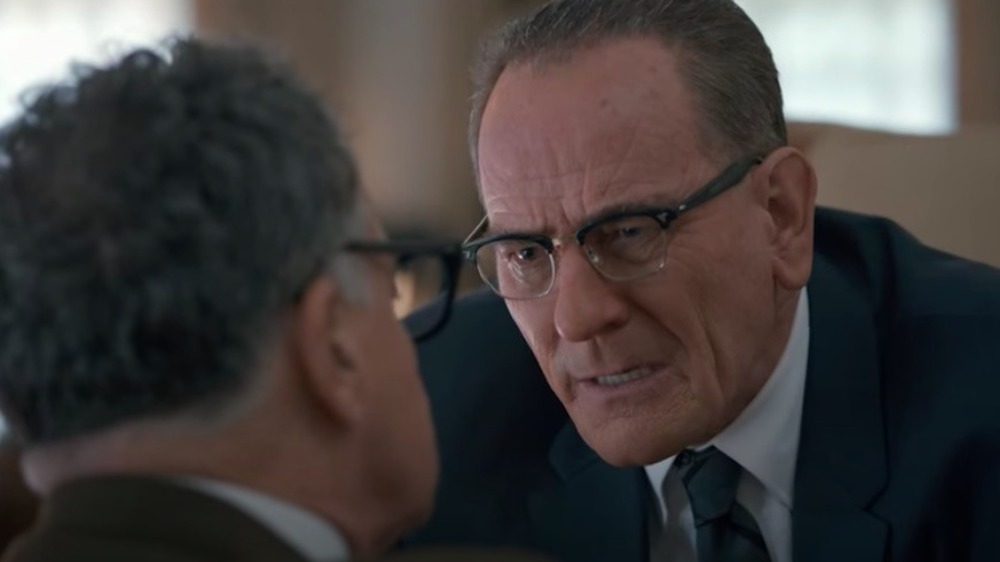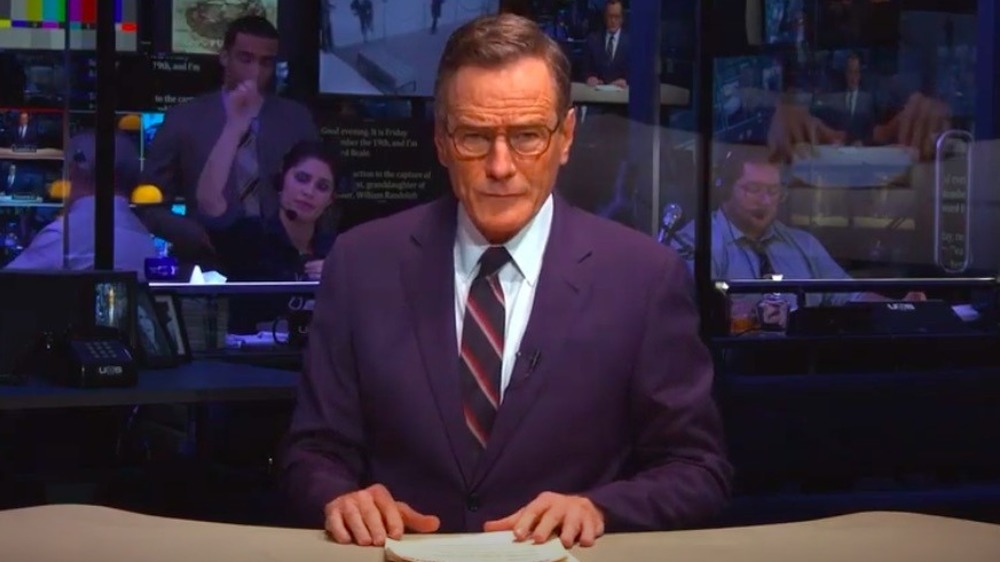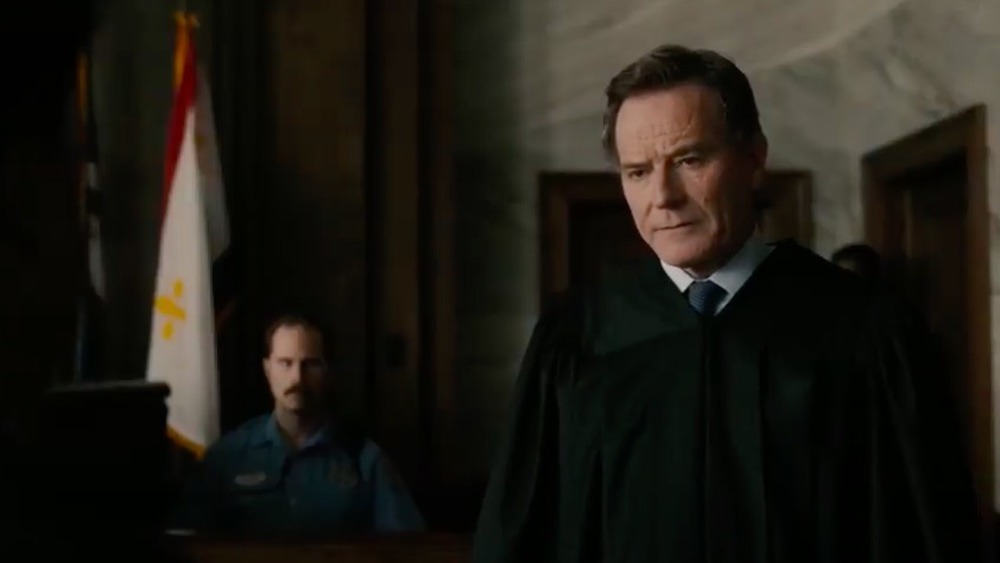The Untold Truth Of Bryan Cranston
While playing the foolish dad on Malcolm in the Middle may have made Bryan Cranston a recognizable face (and even garnered him a few Emmy nominations for his supporting role), it was his truly breakout role as antihero Walter White in Breaking Bad that skyrocketed Cranston's career. For the role of Walter, he won three consecutive Emmys for Outstanding Lead Actor in a Drama Series — only the second lead actor and the first on a cable series to achieve this – and was nominated for the other two seasons.
Since Breaking Bad ended, Cranston has worked across film, television and theater. His turn as President Lyndon B. Johnson in All the Way resulted in a Tony win — he also starred in the film adaptation made for HBO, which he received an Emmy nomination for — as did his portrayal of Howard Beale in Broadway's production of Network, based on the 1976 film of the same name.
And these are just some of the most well known facts about the star. Here is the untold truth of Bryan Cranston.
Both of Cranston's parents were actors
Considering his firm grasp on the craft, it likely won't come as a surprise that acting runs in Cranston's family: both his mother and his father were actors for some time in their lives.
Cranston's mother, Audrey Peggy Sell, was a radio actress, although there is very little information about her projects. Meanwhile, his father, Joe Cranston, acted on screen, mostly in television, making his work much easier to track down. He acted in a slew of television roles from 1953 to 1961. These acting credits include some one-off appearances, as well as recurring roles, on Life with Elizabeth, The Gale Storm Show: Oh! Susanna, and My Three Sons. He even has a couple of writing credits and one directing credit (the latter for the 1988 film, The Big Turnaround).
Audrey Peggy Sell and Joe Cranston even met for the first time in an acting class, truly cementing the Cranstons' ties to the craft.
Both parents abandoned him at a young age
Cranston has opened up on multiple occasions about the tumultuous childhood he had, due to both of his parents leaving him and his brother. In an interview with U.K.'s Sunday Times, he discussed his parents' abandonment and how that has affected him throughout his life.
When he was just 11 years old, Cranston's father left the family because he was frustrated with his stagnating career. After his father left, his mother began to break down, turning to alcohol to cope and ending up with a debilitating addiction. She soon sent Cranston and his brother to live with their grandparents.
Cranston opened up about the pain he felt, telling the Times, "He chose not to be with us or see us or be a father. My mother chose to become an alcoholic and drown her sorrows and sadness and resentment. She was like a ghost of herself. And no one ever explained why he left." He elaborated that the pain was exacerbated by the close relationship he had with both of his parents for the first 10 years of his life, just to have it disappear. He continued, "It's worse than if they died in a car crash, because they were still there physically, somewhere." Luckily, he did reconnect with both of his parents later in life, something he says he is grateful for.
Cranston was almost a police officer
Cranston almost had a very different career: when he was younger, he wanted to become a police officer. In an interview with Route Magazine, he explained that his brother joined an organization called Police Explorers, which traveled as a group pretty frequently. Having done very little traveling while growing up, Cranston joined as well.
He also speculates that he wanted to join the program so that he could find male role models to replace his father in his life. He told the magazine, "Looking back in retrospect, I think it was the attraction of a strong male role model. These grown men with authority that carried a gun and had a badge and had a swagger to them, and I thought, 'Wow, that's masculine.' That's what a man is."
After graduating first in his class in the program and finding he had "an aptitude for it," he planned to study Police Science in college and then join the Los Angeles Police Department. However, while he was in college, he discovered acting classes — and re-evaluated his plans for a very specific reason. He said, "I took an acting class and realized that girls were so much prettier in the acting classes than they were in the Police Science, and it was like, oh my! Because of that it threw me for a loop and I realized I was ambivalent towards my future plans and I didn't know what to do." As we know, acting won out in the end.
He spent time on a soap opera
One of Cranston's earliest roles was on a soap opera called Loving, which ran from 1983 to 1995 — with a whopping total of 3,169 episodes. Cranston appeared in just five of those episodes, from 1983 to 1984.
While speaking with Variety, Cranston discussed the challenges of acting on a soap, namely the fast-paced environment, in which the cast and crew have to work on tight schedules to get out the daily episodes. He explained, "The challenge on a soap opera is how to be authentic with basically no rehearsal. You learn your lines the night before. With that kind of turnover, how do you get to a place that feels honest? That was hard for me."
He also addressed the stigma that soap operas have of being a lesser acting experience, whereas, in reality, the actors have to possess just as much talent as that of other series formats. Cranston found it to be an experience that only strengthened his acting skills. He concluded, "I think soap operas are unfairly judged as less valued acting experiences. They are indeed extremely challenging. It felt like I crossed a threshold from that point on."
He's grateful for a late-career breakthrough
Cranston has been acting consistently since the early 1980s, long before he gained any sufficient notoriety. Some of those earlier roles were even in higher profile shows and films, such as a recurring role in Seinfeld, from 1994 to 1997 as Tim Whatley. However, it was when he was cast as Hal Wilkerson in Malcolm in the Middle – his first long term, series regular role — that his career became truly cemented in a more public manner.
Cranston was 40 years old at the time he landed the gig, which he now looks back on as something he is grateful for. In the Route interview, he reflected upon his career before Malcolm in the Middle, during which he was working steadily and, along with his wife's income (who is also an actor), was doing just fine financially. He continued, "I was already a father, a husband, a homeowner, I knew what was important...We didn't go out and buy anything, we were just putting that money in the bank, putting it in a 529 plan for our daughter to be able to go to college, so all that stuff was happening."
Cranston learned how to make meth
As Breaking Bad fans know, Cranston's character Walt is known for his 99.1% chemically pure crystal meth, which is, famously, blue in color. Being such a key detail of the show, it makes sense that the cast and crew would partake in extensive research about the process in order to ensure that everyone fully understood the logistics.
Cranston revealed on the Howard Stern Show in 2012 that, on the set of the show, they actually learned the step-by-step process of cooking meth. He said, "We were taught how to make meth [by] DEA chemists, who were consultants on the show. We didn't cook it, but we were told exactly the process at that high level."
When Stern joked that he had a feeling Cranston had actually cooked it at some point since learning, Cranston simply laughed it off and retorted, "Well, I made one with and one without nuts." He also elaborated on the difficulty of the process, explaining, "There are so many volatile components to it that at any given time, you could literally blow up. So you had to be very careful and very specific to follow this. Most of the cooks are also meth heads themselves. That's why they get themselves in trouble and you see burn marks, or their hands are missing."
He's completely satisfied with Walter White's arc
Alongside the fans, Cranston got to see Walt's evolution from protagonist to antagonist over the course of Breaking Bad's five seasons. He transformed from a high school chemistry teacher, bitter and resentful over his middling life and career, to a hardened criminal, claiming he continued to cook meth for the sake of his family's security when he's really doing it, as he says in the finale, because he liked being good at it.
In an interview with Time magazine, Cranston was asked if it was strange to see Better Call Saul – which is the same universe as Breaking Bad – going on without his character's involvement. He answered that it isn't strange because, while it does have a familiar feel, Better Call Saul is its own story, one of which he himself is a fan of.
Plus he feels complete closure with his character. He told Time, "I don't miss playing Walter White. I miss Albuquerque and what it meant to me, and the good people of New Mexico who really did help us create an additional character to our show. I miss that. I don't miss the character, because there was a complete beginning, middle and end to the story. It was so satisfying that I felt good to walk away."
He'll always say yes to Vince Gilligan
Cranston has said in more than one interview that Vince Gilligan, the creator of Breaking Bad, "changed [his] life" by casting him. With that gratitude, Cranston insists that he will always agree to any project that Gilligan approaches him with.
In an interview with The Hollywood Reporter, he discussed his decision to appear in the follow-up movie to Breaking Bad, titled El Camino (which stars Aaron Paul and depicts Jesse's aftermath), even though his schedule was densely packed — during this time, he was starring in Network on Broadway. He said he wanted to support both Gilligan and Paul. He continued, "Aaron and I both say, if [Gilligan] starts to ask a question, we just say, 'Look, the answer is yes, whatever you're going to ask. We'll do whatever.' He changed our lives. So we're eternally grateful to him and happy to do it."
Naturally, many fans are waiting anxiously to see if Walter White will make an appearance during the final season of Better Call Saul. When asked about this by Time, Cranston's response aligns with what he has said so far about working with Gilligan: "My point-of-view on it is that if Vince Gilligan wants me to be in the show, I'll be in the show. Quite frankly, if he called today and asked me to be on the show, I would say yes before he finished the question. Because he changed my life."
Cranston stayed in character to play LBJ
Shortly after Breaking Bad ended, Cranston turned to the theater stage to play President Lyndon B. Johnson in Robert Schenkkan's All the Way. It follows the former president's effort to get the Civil Rights Act of 1964 supported by both members of Congress and civil rights leaders, including Martin Luther King, Jr. After a successful run on Broadway — with Cranston winning a Tony — it was adapted into a made-for-television movie, with Cranston reprising his role, that premiered on HBO in 2016. This adaptation led to an Emmy nomination for Cranston.
In his interview with Time, Cranston discussed what it was like to take on one role for such an extended period of time — in total, Cranston played LBJ on and off from 2013 to 2016. He described the importance of fully grasping the character, stating, "I've got to dig into this character, learn as much as I can, and be a student to that world and that era."
He elaborated that staying in character between takes helped to keep his mindset aligned with LBJ's. Talking about finding "the nature of the character," — including the Texas accent — he said, "I just felt it was easier if I stayed in character with the voice, and I said, 'Well, honey, look at that dress on you, my God, that just brings out the color of your eyes...' Just playing with it, with conversations that were appropriate for the time."
He had to "erase" his experience watching Network
Considered a classic (including by Cranston himself), Sidney Lumet's 1976 film Network chronicles the world of a fictional television network struggling with poor ratings. When longtime news anchor Howard Beale finds out he is going to be let go, he announces live on air that he plans to kill himself on the next broadcast. The network fires him, but upon realizing how much the ratings went up upon that sudden announcement, begins to exploit Howard for its own profit.
Decades later, Network was adapted for Broadway in 2017 by Lee Hall. Cranston took on the role of Howard Beale from opening night through 2019 — to great acclaim, including his second Tony win. Speaking with Deadline, Cranston said he was attracted to the role right away, but spent a lot of time thinking about whether or not he wanted to play a part that was already done so well in the film (by Peter Finch, who won an Oscar for his portrayal).
Cranston described his decision-making process, beginning with revisiting the film to reevaluate the story and its themes, with the plan to then "let it go." He continued, "I needed and wanted to find my own avenue toward my version of Howard Beale, and so I just let that all go and erased everything, just let it all get down to nothing, just let it dismantle to get down to neutral and then start to rebuild in a way that felt organic to me."
Cranston is attracted to "damaged characters"
In 2020, Cranston returned to television with the drama series Your Honor. Stepping back into the lead role of a TV series, Cranston plays an honorable judge who puts his morals aside when his son accidentally kills another teen in a hit and run accident.
Cranston recently spoke with the LA Times to discuss his new role, which the piece describes as "the latest addition to his extensive gallery of complicated figures with a dark edge." While describing what attracts him to a character, Cranston confessed he is drawn to intricate and complicated characters with wavering morals. He told the Times, "I am attracted to damaged characters that still have some manner of humanity and decency within them, despite their flaws and shortcomings."
Further, he feels that those are the types of characters that viewers will most connect with. He concluded, "Audiences relate to people like that, saying, 'I'm not good at that, but what would I do in this situation?' When I tell people the elevator pitch of what Your Honor is about, they say, 'I would do the same thing. I would do anything to protect the life of my child.'"
